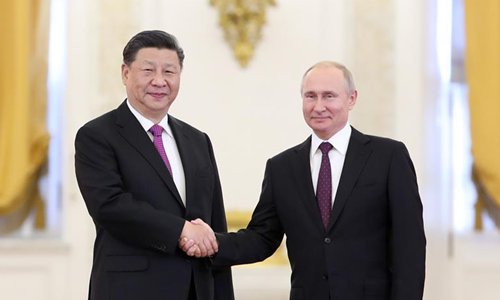HOME >> OPINION
China, Russia come together to shield global strategic stability
By Ji Zhiye Source:Global Times Published: 2019/6/10 21:48:41

File Image: Xinhua
Chinese President Xi Jinping and Russian President Vladimir Putin signed a joint statement on strengthening contemporary global strategic stability in Moscow on June 5. The statement sends the world a strong message that China and Russia are making great efforts to maintain global strategic stability and world peace.To ensure its "absolute security" after the Cold War, the US unilaterally undermined international law, relying on its powerful military and strategic arsenal. Despite strong opposition from China, Russia and other countries, the Bush administration still pulled out of the 1972 Anti-Ballistic Missile (ABM) Treaty in June 2002, and began to deploy its missile defense system around the world. This upset the strategic balance with Russia. Since then, the US has ratcheted up deployment of missile defense systems. In 2010, then US president Barack Obama and then Russian president Dmitry Medvedev signed the New Strategic Arms Reduction Treaty (New START), which to some extent, helped maintain strategic stability between the US and Russia.
However, the Trump administration quit the Iran nuclear deal in May 2018, damaging efforts at nuclear non-proliferation. The Trump administration has decided to pull out of the Intermediate-Range Nuclear Forces (INF) Treaty, hurting global strategic stability.
Currently, New START, which is set to expire in 2021, is the only international treaty left to maintain strategic balance and stability between the US and Russia. Up to now, there is no negotiation between the two sides to extend the treaty or sign a new one. Russia' attitude of the Trump administration shows that the US has no desire to maintain strategic balance and stability. Through the joint statement, Xi and Putin have declared to the world that China and Russia oppose any unilateral destruction of international strategic stability. On June 25, 2016, Xi and Putin had foreseen that global strategic stability would face severe challenges. Therefore, they published a joint statement on strengthening global strategic stability in Beijing. The statement said some countries and military-political alliances promoted the deployment of anti-missile systems in Eurasia. It also mentioned the possibility of acquisition of biological and chemical weapons by international terrorist organizations.
Today, international security is under severe challenge. In this context, the new joint statement says that US withdrawal from ABM Treaty and INF Treaty as well as its deployment of strategic missile defense systems in various regions of the world and outer space undermine strategic stability. Besides, this could have a negative impact on the prospects of New START.
The statement calls on states to bring back all nuclear weapons deployed outside their borders to their national territories. It also points out that the US refusal to ratify the Comprehensive Nuclear-Test-Ban Treaty would seriously undermine the treaty and expresses regret over the US creating hurdles in the way of UN Group of Governmental Experts making recommendations on substantial elements of an international legally binding instrument on the prevention of an arms race in outer space
Compared with the statement signed in 2016, the new statement is more particular in pointing out the harm done by the US to strategic stability. The statement calls on the entire international community, including the US, to eliminate mutual concerns through dialogue and consultation.
The statement once again shows the world that in the struggle to maintain global strategic stability, the comprehensive partnership between the two nations has become stronger. It voices the common aspiration of peace-loving people all over the world.
The author is vice president of China Arms Control and Disarmament Association, and former president of China Institutes of Contemporary International Relations. opinion@globaltimes.com.cn
Posted in: VIEWPOINT